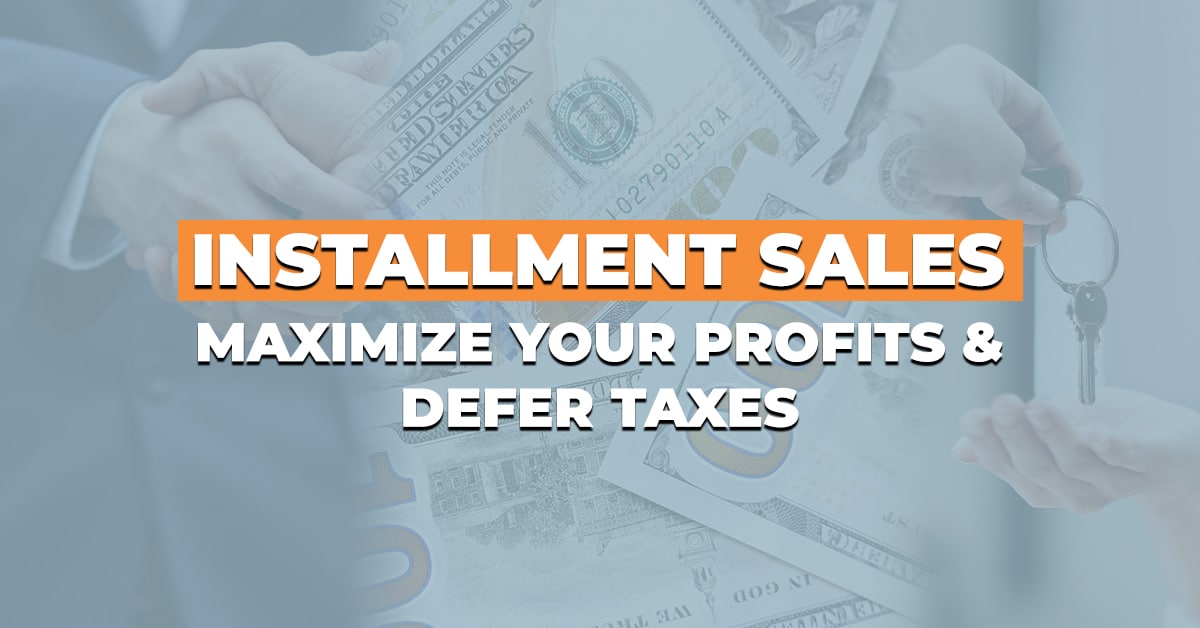Installment Sales: Maximize Your Profits And Defer Taxes

Selling your business or a piece of real estate often leads to a sizeable capital gains tax. But what if it didn’t have to? Installment sales have the potential to maximize your profits, defer taxes, and even potentially reduce how much capital gains tax you ultimately pay.
How do installment sales work? What are the tax benefits of installment sales? What are the potential risks of installment sales?
At Jones CPA Group, we care about your business goals, so we’ve provided this information to help you decide whether an installment sale is right for you. Questions? Contact us or schedule a free business consultation.
What Is an Installment Sale?
An installment sale is the sale of a property or business where you’ll receive at least one payment after the tax year in which the sale occurs. Instead of paying capital gains taxes on the entire sale price all at once, you can spread the taxes out over several years as you receive installment payments.
Depending on the amount of the sale and your modified adjusted gross income (MAGI), you may be able to stay in lower capital gains tax brackets by limiting how much profit you get each year from the sale of your business or property.
The experienced accountants at Jones CPA Group can help you determine whether you may be able to lower your capital gains tax rates through an installment sale.
How Does it Work?
Installment sales are business sales structured so ownership is transferred at once, although the buyer makes payments (with interest) over a period of time (covering at least 2 tax years).
- You sell your business’s stock to a buyer
- The buyer signs a promissory note
- The buyer gets cash flow from the businesses and pays taxes on business profits
- The buyer uses post-tax cash flow from the business to make payments to you
- The seller gets capital gains plus interest income
Situations Where Installment Sales Aren’t Allowed
Installment sales aren’t appropriate for all situations:
- You can’t use the installment method to report gains from the sale of inventory or securities and stocks traded on an established securities market
- Installment method rules don’t apply to sales that result in a loss
- You must report any portion of the gain from the sale of depreciable assets that’s ordinary income under the depreciation recapture rules in the year of the sale
Things to Consider
While you will defer some of your tax payments, you won’t necessarily save money unless the sale is structured to keep you in a lower tax bracket each year than you would be in if you got all the proceeds at once. Additionally, capital gains taxes could increase in the future, and you would need to pay the tax rate for the year you receive the income rather than the year in which you made the sale.
You should also require the buyer to carry life insurance to secure your payment in case the buyer dies before fully repaying you.
Tax Benefits of Installment Sales
In addition to deferring your tax payments to the years when you receive installment payments rather than paying them all at once, an installment sale could potentially allow you to stay under the thresholds for triggering the 20% long-term capital gains rate or the 3.8% net investment income tax (NIIT).
Other Benefits of Installment Sales
Since the buyer is paying you interest on the sale price, you also make more money in the long run. An installment sale might also help you get a better deal on the sale of your business or property since it can appeal to a buyer that doesn’t have enough cash to pay your asking price in a lump sum.
Tax Risks of Installment Sales
Installment sales aren’t without tax risks:
- Depreciation recapture must be reported as gain in the year of sale, no matter how much cash you receive, potentially leading to you owing more tax that year than you receive as cash proceeds from the sale.
- If tax rates increase in the future, the overall tax you end up paying could be higher.
Factors That Impact a Sale Agreement
Sellers must consider a wide variety of factors before finalizing a sale agreement:
- Down payment. You want a high enough down payment to ensure the buyer is invested in paying and a low enough payment to minimize your capital gains tax.
- Owner approval. If you aren’t the only owner, you must get permission from the other partners or owners before doing an installment sale.
- Terms of the agreement. While a longer term agreement decreases your tax liability each year, it also increases the risk of collectability, especially if the business is impacted by changes in technology or supply chain issues.
- Contingency payments. The seller may be able to get additional payments based on the success of the business in selling products that existed at the time of the sale.
- Interest charged. Interest rates should be similar to what a lending institution would charge and generate additional interest income for the seller.
Finding the Right Buyer
When you sell your business all at once, it doesn’t matter how the buyer runs it. On the other hand, when you do an installment sale, you need to make sure the buyer has the skills necessary to operate the business in the long term so they can continue making their payments.
Keep in mind that a “bargain sale” to a family member counts as a gift with potential gift tax consequences. You must use market interest rates and sell at fair market value to avoid gift tax consequences.
Work With an Experienced Installment Sale Houston CPA Firm
Jones CPA Group genuinely cares about your goals for your business and understands that accounting and tax (we call it “maintenance”) require careful planning, a proactive approach, and a customized plan. We can help you determine whether an installment sale would be beneficial in your situation or may end up costing you more in the long run.
We can do far more than just give you advice about whether to do an installment sale. When you turn over the complicated task of managing your bookkeeping, accounting, and taxes to Jones CPA Group, you gain a partner who genuinely cares about you and your business. Contact us or request a free business consultation today.






